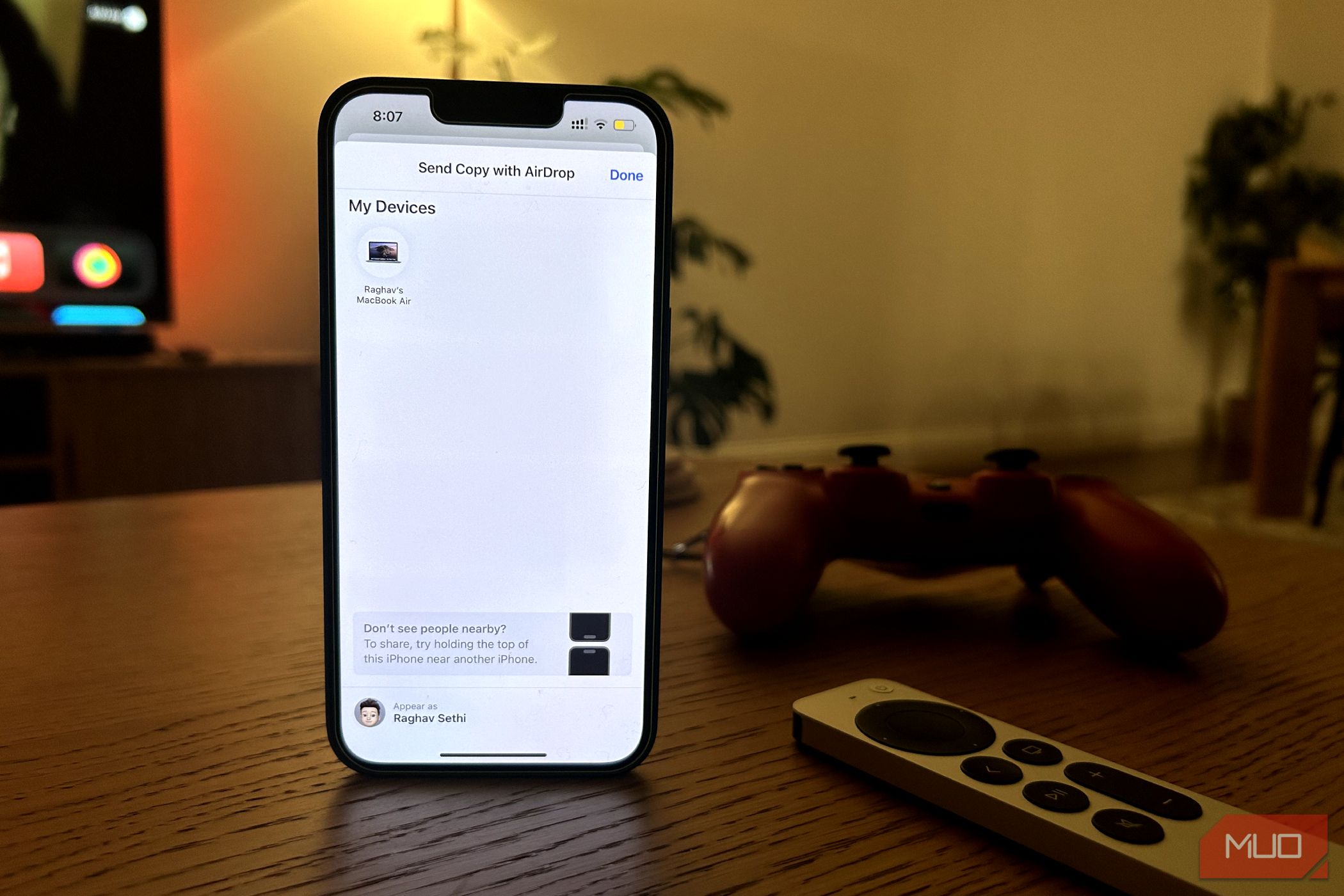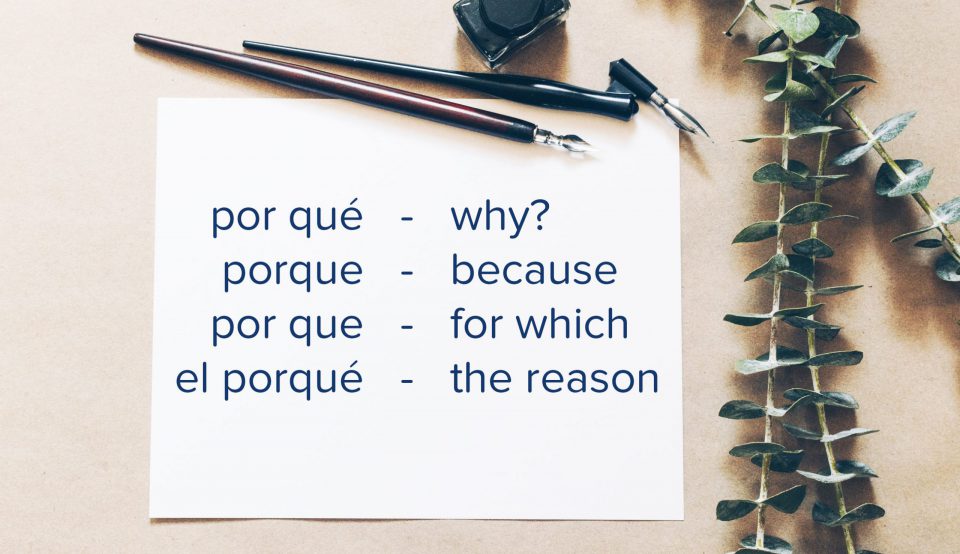
Examining Por Que vs Por Qué in Context

Examining Por Que vs Por Qué in Context
Porque vs**por que** and**porqué** vs por qué : the real Clash of the Titans, the ultimate mystery of our world. What’s the difference and how do you correctly use all these_p_ orques in Spanish? Well, buckle up because today you are finally going to find out and, most importantly, glue into your brain for eternity, the answers you’ve been looking for.
Essentially, porque, por que, porqué and_por qué_ are allpronounced the same (with some minor differences related to emphasis), but they mean totally different things. While**porque** translates to“because” ,por que translates to“for which” , el porqué to“the reason” and**por qué** to“why” . It’s obviously incredibly easy to change the whole meaning of a sentence with a single misplaced Spanish accent .
If you are an English speaker, you know that’s not new. We also have our struggles with “your” and “you’re”, “whose” and “who’s”, “these” and “this”. Even if you know English to perfection, sometimes your brain just goes blank and you don’t know what’s the correct form anymore. But the porque, por que, porqué and_por qué_ problem seems even more complicated than that. So read on to discover rules, eloquent examples in Spanish and the correctSpanish pronunciation for each situation.
1. Por qué – how to ask“ why?” in Spanish
Let’s start with the two most common porques:por qué and_porque_ – “why?” and “because” – the question and the answer.
Although you may be confused right now with all these versions of – basically – the same word, this**por qué** will always be written in two words and an accent over “e” when you want to ask a question:“why?”. Let’s add the distinctive Spanish question marks and see some examples:
- ¿Por qué no vienes? –“Why aren’t you coming?”
- ¿Por qué no comes el pastel? –“Why aren’t you eating the cake?”
- ¿Por qué no aprendes español con Mondly? –“Why don’t you learn Spanish with Mondly?”
- ¿Por qué lees libros en español? –“Why do you read books in Spanish?”
Now let’s see some examples where**por qué** is used as a reported or indirect question. Here are some examples to help you understand better:
- Me preguntópor qué no leo libros en español. – “He asked mewhy I did not read Spanish books.”
- No sépor qué rechazaste la oferta. – “I don’t knowwhy you refused the offer.”
- Quiero saberpor qué está tan feliz. – “I want to knowwhy he/she is so happy.”

“Let’s write” by Kelly Sikkema©
2. Porque – “because” or how to give reasons in Spanish
As you already know, whenever you ask “why?” in English, the other person will probably begin their answer using “because”. Well, Spanish has the same rules: whenever you ask someone“por qué”, they will probably begin their answer with the plain and simple“porque” with no spaces and no accents. Let’s see some examples:
- ¿Por qué no vienes a la fiesta?Porque estoy cansado. – “Why are you not coming to the party?Because I’m tired.”
- ¿Por qué estás tan feliz?Porque me voy de vacaciones mañana. – “Why are you so happy?Because I’m going on vacation tomorrow.”
- ¿Por qué me llamaste?Porque necesitaba tu ayuda. – “Why did you call me?Because I needed your help.”
- Porque quiero mejorar mi español. – “Because I want to improve my Spanish.”
In other cases,“because” and“porque” can become the subordinating conjunctions that link two clauses: the reason and the result. Let’s see some examples to help you better understand:
- No llegué a tiempoporque perdí el tren. – “I didn’t make it on timebecause I missed the train.”
- No me uní a la claseporque estoy aprendiendo español más rápido con Mondly. – “I didn’t join the classbecause I’m learning Spanish faster with Mondly.”
Well, this was the easy part of the great mystery behind p_orque_ vs_por que_ . Lucky for those of us who want tolearn Spanish, the simplest_porques_ are also the most frequently used.
But it’s always better to be safe and learn all the possible outcomes than learn only half of them and feel sorry afterwars. So let’s move on to the more problematic_porques:_ por que (for which) and el porqué (the reason).
3. Por que – “For which”
The knottiest of the four_porques_ is definitely the**por que** that translates to“for which”. Even in English we rarely use this word arrangement in a sentence.
Let’s look at “this is the jacket for which I was looking”. That doesn’t sound exactly natural, does it? A more logical way to express the same information would be “this is the jacket I was looking for”. But Spanish can’t end a sentence with a preposition. So let’s explore the two situations where you’ll need to use“por que”.
- Esta es la razónpor que no vine. – “This is the reasonfor which I didn’t come.”
- Cual es el motivopor que te has ido? – “What is the reasonfor which you left?”
While in the original Spanish sentence_la razón por que_ can be replaced with_por la que / por la cual,_ in the English translation, “the reason why” can always take the place of “the reason for which”. Same goes for the second example:el motivo por que can be replaced with_el motivo por el que / por el cual._ In day-to-day conversations in Spanish, people are more likely to use the more natural forms:por la/el que, por la/el cual.
Another possible situation where you’ll need to use**por que** is when you’ll have phrasal verbs like_abogar por_ (advocate for),preocupar por (worry about) or_luchar por_ (fight for) followed by “que”.
- Yo estoy preocupadapor que el vuelo pueda cancelarse. – “I’m worried that the flight might be cancelled.”
- La profesora abogapor que los alumnos no lleven deberes a casa. – “The teacher advocates that students should not receive homework.”
- Mi abuela se preocupapor que comamos bien. – “My grandmother worries about our nutrition.”
- La sociedad luchópor que las mujeres pudiesen votar. – “Society fought for women’s suffrage.”
Well, now it’s all starting to make sense, doesn’t it?

“Studying” by David Iskander©
4. El porqué – The reason
Bare with me. This is the last“porqué” and the easiest“porqué”.
El porqué usually translates to“the reason”, but it can also mean“why” – used as a noun. Here’s an example from Simon Sinek : “Everybody has a WHY. Do you know yours?”. In Spanish, that would translate to “Todos tienen un PORQUÉ. ¿Conoces el tuyo?”. Here are a few more examples with el porqué :
- El quería saber más sobrelos porqués de mi partida. – He wanted to know more aboutthe reasons for my departure.
- Todo tieneun porqué. – Everything has a reason.
- Este buen clima esel porqué de mi felicidad. – This nice weather isthe reason for my happiness.
- ¿Cuál esel porqué de su elección? – “What isthe reason of your choice?”
Officially, the four_porques_ are no longer a mystery for you. Yey!
Now, if you want to unravel even more secrets about the Spanish language, you can also check our in-depth articles Spanish verbs and Spanish accents .
See_porque_ vs_por que_ and_porqué_ vs_por qué_ in action
Do you want topractice what you’ve learned about the four_porques_ ? Check Mondly, the revolutionary language learning platform that makes language learning fun, fast and easy!
Mondly is a pocket-held language tutor that allows you to put your brain on autopilot andenjoy the ride to fluency in 33 languages. By combining solid neural science, cutting edge technologies, bite-sized Daily Lessons and a gamified experience guaranteed to make you addicted to learning languages,Mondly gets you fluent faster than you could ever imagine.
It all goes like this: if you like to play games, you will love Mondly. Each lesson, regardless of the language or languages you want to learn, is designed to beef up your knowledge little by little andshape you into a better, more natural speaker.
Besides, there are NO computer-generated voices in Mondly. All the recordings are made with fluent speakers so you canlearn only from the best from the comfort of your own home. All these while also avoiding the fear of embarrassing yourself by practicing conversations with a fluent speakers.
Start using Mondly for free on your computer or tablet or, better yet, download the Mondly app on your iOS or Android device and learn languages fast anytime, anywhere.
Do you want to learn Spanish with Mondly in only 2 minutes a day?
Also read:
- [New] 2024 Approved Exploring the Depth of Editing with GoPro Studio's Capabilities
- [Updated] Prime Portable Canvas Apps for Windows Free and Charged
- [Updated] Push Boundaries with Unique Split-Screen Videos for YouTube for 2024
- East European Linguistics: Uk & Rus Analysis
- Fixing the Chrome Freeze and Blank Screens
- How to Update Realtek PCIe FE Family Controller Drivers in Windows 7
- Mastering the Art of Pet Eye Restoration in Pictures
- Mondly Streamlines Language Acquisition - New Edition
- Resolved: HP Printer Lacking Paper Delivery
- Step Into The Future of Language Learning - MondlyAR VR Experience!
- Strategies to Triumph at Language Certifications
- Unveiling Farsi's Roots: Benefits of Mastery
- Title: Examining Por Que vs Por Qué in Context
- Author: Christopher
- Created at : 2025-01-18 17:13:09
- Updated at : 2025-01-22 16:18:54
- Link: https://mondly-stories.techidaily.com/examining-por-que-vs-por-que-in-context/
- License: This work is licensed under CC BY-NC-SA 4.0.